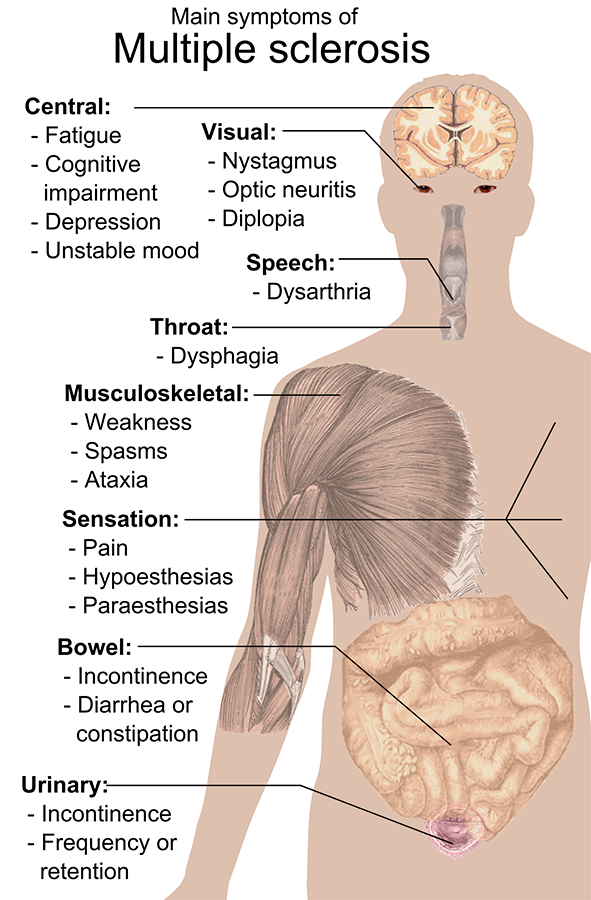Multiple Sclerosis : Support and Education

This neural system works efficiently unless there is a disease process affecting the pathways in the spinal cord and brain. Multiple sclerosis is one of the diseases that can affect these pathways.
Myelin, the fatty substance that surrounds and insulates nerves and facilitates the conduction of nerve impulses is the initial target of inflammatory destruction in multiple sclerosis. MS is characterized by intermittent damage to myelin , called demyelination. Demyelination causes scarring and hardening (sclerosis) of nerve tissue in the spinal cord, brain, and optic nerves. Demyelination slows conduction of nerve impulses, which results in weakness, numbness, pain, and vision loss. Ultimately, this may result in deterioration of the nerves themselves, a process that's not reversible.
Because different nerves are affected at different times, MS symptoms often worsen (exacerbate), improve, and develop in different areas of the body. Early symptoms of the disorder may include vision changes (e.g., blurred vision, blind spots), numbness, dizziness, and muscle weakness. MS can progress steadily or cause acute attacks (exacerbations) followed by partial or complete reduction in symptoms (remission). Most patients with the disease have a normal lifespan.
Symptoms vary widely, depending on the amount of damage and which particular nerves are affected. People with severe cases of multiple sclerosis may lose the ability to walk or speak. Multiple sclerosis can be difficult to diagnose early in the course of the disease, because symptoms often come and go — sometimes disappearing for months.
Although multiple sclerosis can occur at any age, it most often begins in people between the ages of 20 and 40. Women are more likely to develop multiple sclerosis than are men.
There is no known cure for MS. Treatments attempt to return function after an attack, prevent new attacks, and prevent disability. MS medications can have adverse effects or be poorly tolerated, and many patients pursue alternative treatments despite the lack of supporting scientific study.
The prognosis is difficult to predict; it depends on the subtype of the disease, the individual patient's disease characteristics, the initial symptoms and the degree of disability the person experiences as time advances. Life expectancy of patients is nearly the same as that of the unaffected population.
The unpredictability of MS affects the caregiver in a way unlike other chronic diseases. Caregivers are unable to predict the onset of a relapse, the progression of the disease, or even the functional ability of the patient over the course of a day. Not only do physical symptoms of the patient increase caregiver burden, but the psychological and emotional aspects of MS also present challenges for patients and family members.
Profound fatigue, sensory symptoms, and vision loss are common among MS patients. The most difficult invisible symptom for the caregiver to understand is fatigue. MS-related fatigue is very different from regular fatigue because it generally occurs daily and can occur in the morning despite a good night's sleep. It can worsen during the day and is likely to interfere with normal activities. The invisible and unpredictable nature of fatigue can make it difficult for the caregiver to understand and appreciate its intensity.
Caring for the individual with MS causes unique challenges for the caregiver. Because MS develops in young adulthood, the initial impact can begin during the years of college education, marriage, career development, and family life.
As your loved one's multiple sclerosis progresses from the early stages to more disabling periods, your role as a caregiver will likely change. Knowing what types of responsibilities you and your family might have to deal with can help you prepare. To be the best caregiver you can be for someone living with MS, it's important to be more than just sympathetic — you also have to understand the disease, how it progresses, and what your loved one might need from you over time.
• Create a Safe Environment: Some simple home adjustments can make a big difference in the safety of a loved one who's living with multiple sclerosis. Find out about common home hazards, as well as steps you can take to make your home more comfortable and easy to live in.
• Handling an MS Diagnosis: It's difficult to know how to help your loved one cope with an MS diagnosis, especially as you're dealing with your own emotions about the news. These strategies can help you put the diagnosis in perspective and together figure out ways to move forward.
• Managing Medical Tests: Throughout the course of your loved one's MS treatment, a variety of medical tests will be required to check on the status of the disease, as well as to see how well your loved one is responding to treatment. As a caregiver, you may need to assist with common MS tests.
Educational programming for healthcare professionals
MEDIVISION ™ collaborates with recognized leaders in the fields of medical and pharmaceutical sciences to provide educational programming for medical specialists, universities and medical schools. Our DVD catalog contains over 200 titles in 35 separate healthcare fields, including a wide variety of specialist topics essential to healthcare professionals.
Multiple Sclerosis programming >